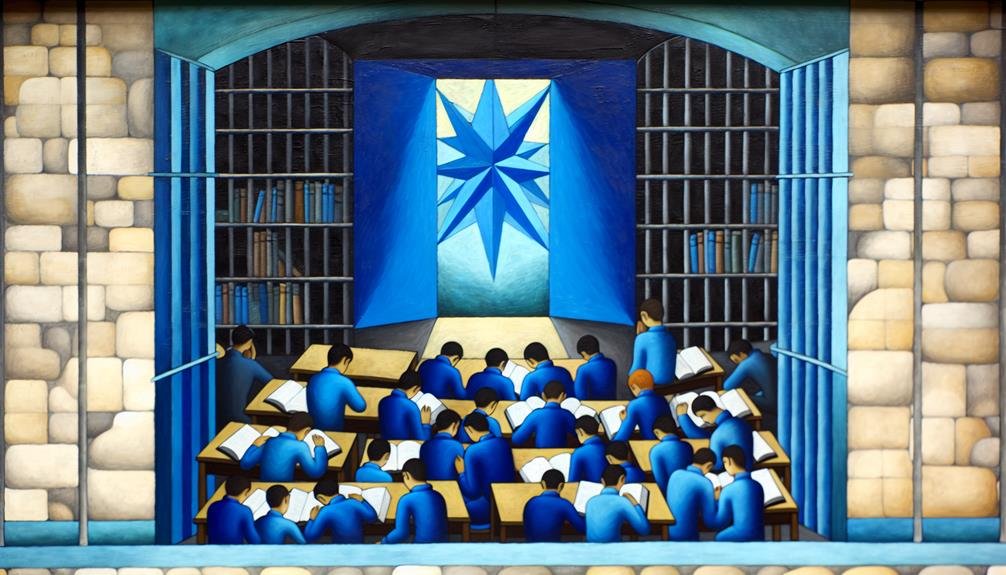Education in prisons offers a gateway to personal transformation and societal change. Pros? Imagine a world where inmates gain new skills, boost confidence, and find a fresh start post-release. It’s a chance to break the cycle of crime, improve neighborhoods, and create hope for a brighter future. But hey, challenges exist too – from funding shortages to outdated materials. The journey of education in prisons is a rollercoaster of highs and lows, but the ride is worth it for the transformation it brings. Curious to know more about the impact? Keep exploring for a deeper exploration into this engaging journey.
Takeaways
- Education in prison reduces recidivism rates and promotes successful reintegration into society.
- Limited resources and funding challenge the implementation of educational programs.
- Inmates gain valuable skills, knowledge, and a sense of purpose through education.
- Education in prison can be a cost-effective investment with long-term societal benefits.
- Overcoming stigma and bureaucratic obstacles is crucial for the success of educational initiatives.
Reduced Recidivism Rates
Studies have consistently shown that providing education programs in prisons leads to a significant reduction in recidivism rates. By offering inmates the opportunity to learn and grow academically, they are equipped with valuable skills that can help them reintegrate into society successfully. Education serves as a powerful tool for rehabilitation, empowering individuals to make positive changes in their lives and break the cycle of criminal behavior.
Incorporating education into the prison system not only benefits the inmates but also the community at large. When individuals have access to educational opportunities during their incarceration, they are more likely to secure employment upon release, reducing the likelihood of reoffending. This, in turn, leads to safer neighborhoods and lower crime rates.
Moreover, education fosters personal growth and development, instilling a sense of purpose and self-worth in individuals who may have previously felt hopeless. It opens doors to new possibilities and empowers individuals to envision a brighter future for themselves.
Through education, inmates can transform their lives and become productive members of society, making our communities safer and more inclusive.
Improved Reentry Opportunities
Enhancing reentry opportunities for individuals leaving incarceration involves providing holistic support services and resources to facilitate a successful reintegration back into society. It’s like giving them a helping hand as they step back into the world outside the prison walls. Imagine having someone guide you through a maze; that’s what these support systems do for those reentering society.
Let’s take a look at how these reentry opportunities can make a difference:
| Benefits of Improved Reentry Opportunities | Description |
|---|---|
| Access to Job Training Programs | Helps individuals gain skills for employment. |
| Mental Health Counseling Services | Supports emotional well-being during the shift. |
| Housing Assistance | Ensures individuals have a stable place to live. |
| Peer Support Groups | Offers a network of understanding individuals. |
Cost-Effectiveness

Imagine this: investing in education for incarcerated individuals not only benefits them but also society as a whole. By providing access to educational opportunities behind bars, we’re not just teaching skills; we’re planting seeds of change.
Now, let’s talk numbers. Studies have shown that for every dollar spent on education in prisons, several more are saved in the long run. How’s that for a return on investment?
When individuals gain knowledge and skills during their time in prison, they are more likely to find employment upon release, reducing the chances of reoffending and the associated costs to society.
Rehabilitation Effectiveness
Let’s explore the impact of education in prison on reducing repeat offenses, known as recidivism rates, and the opportunities it provides for developing valuable skills.
By focusing on rehabilitation effectiveness, we can better understand how educational programs behind bars contribute to building a path towards successful reintegration into society.
These points shed light on the transformative power of education in shaping the future for incarcerated individuals.
Impact on Recidivism Rates
Education programs in prisons have shown promising results in reducing recidivism rates among incarcerated individuals, highlighting the effectiveness of rehabilitation efforts within correctional facilities. By providing inmates with access to educational opportunities, such as GED courses, vocational training, and college classes, prisons are not only equipping them with valuable skills but also instilling a sense of purpose and hope for a better future.
Studies have indicated that inmates who participate in educational programs while serving their sentences are less likely to reoffend upon release. This decrease in recidivism can be attributed to the positive impact of education on an individual’s mindset, self-esteem, and employability.
When inmates are given the chance to learn, grow, and envision a different path for themselves, they are more inclined to make positive choices and aspire for a successful reintegration into society.
In essence, education in prisons serves as a powerful tool for breaking the cycle of crime and incarceration, offering a ray of light in what can often feel like a dark and hopeless situation.
Skill Development Opportunities
One of the key components of effective rehabilitation within correctional facilities is providing incarcerated individuals with skill development opportunities. These opportunities are like seeds planted in the minds of those serving time, offering them a chance to cultivate new abilities and interests that can blossom into a brighter future.
Imagine a prisoner discovering a talent for woodworking during a vocational program, transforming a rough block of wood into a beautifully crafted piece of furniture. Not only does this skill provide a sense of accomplishment, but it also opens up possibilities for employment upon release.
Skill development opportunities go beyond just teaching practical trades; they also foster personal growth and confidence. Learning to communicate effectively, manage emotions, or resolve conflicts can be as valuable as mastering a trade. These skills not only benefit the individual but also contribute to a more harmonious and productive environment within the prison walls.
Access to Higher Education

Access to higher education for incarcerated individuals is an essential component in promoting successful reintegration into society post-release. Imagine the transformation that can occur when a person gains access to higher education while serving time. It’s like planting a seed of knowledge that grows into a mighty tree of opportunity once they re-enter society.
Higher education opens doors to new possibilities, allowing individuals to pursue advanced degrees, learn specialized skills, and ultimately secure better job opportunities upon release.
Moreover, access to higher education fosters personal growth and development, nurturing a sense of purpose and direction that can positively impact an individual’s behavior and choices. By engaging in rigorous academic pursuits, incarcerated individuals can cultivate critical thinking skills, enhance their self-esteem, and broaden their perspectives on life.
In essence, higher education in prison not only equips individuals with the knowledge and skills needed for a successful reentry into society but also empowers them to aspire to greater heights and strive for a brighter future beyond the prison walls.
Social Impact
Let’s talk about the social impact of education in prison.
By providing inmates with educational opportunities, we are not just teaching them skills; we are offering them a chance at rehabilitation.
Studies have shown that access to education behind bars can lead to lower recidivism rates, ultimately benefiting society as a whole.
Rehabilitation Through Education
Enhancing access to educational programs in prisons has shown a significant social impact by promoting rehabilitation and reducing recidivism rates among incarcerated individuals. Education in prison goes beyond just teaching academic subjects; it provides inmates with valuable skills, knowledge, and a sense of purpose. By offering opportunities for learning and personal growth, inmates are more likely to reintegrate into society successfully upon release.
Imagine a scenario where a person enters prison feeling lost and disconnected from the world. Through education, they find a passion for learning, gain confidence, and develop essential skills for employment. This transformation not only benefits the individual but also has a ripple effect on their community. By breaking the cycle of crime and incarceration, education in prison contributes to safer neighborhoods and a more prosperous society as a whole.
Education is a powerful tool that can change lives. It offers hope, second chances, and the opportunity for a brighter future. By investing in the education of incarcerated individuals, we invest in the potential for positive change and rehabilitation.
Reduced Recidivism Rates
Education in prison has been proven to significantly contribute to reduced recidivism rates, thereby demonstrating a positive social impact on incarcerated individuals and society as a whole. When inmates engage in educational programs behind bars, they acquire valuable skills and knowledge that can pave the way for a brighter future upon release.
Here are three key reasons why education in prison leads to lower rates of reoffending:
- Empowerment: Education empowers individuals by boosting their self-esteem, confidence, and sense of purpose. With newfound knowledge and skills, inmates are more equipped to reintegrate into society successfully and pursue meaningful opportunities.
- Employability: Inmates who participate in educational programs have a better chance of securing employment post-release. By gaining qualifications and training, they become more attractive to potential employers, reducing the likelihood of returning to criminal activities out of desperation.
- Personal Growth: Education fosters personal growth and development, leading to improved decision-making and critical thinking skills. Inmates learn to assess situations more rationally and consider the consequences of their actions, thereby reducing impulsive behavior and recidivism rates.
Challenges and Limitations

One of the primary obstacles faced in the implementation of educational programs within correctional facilities is the lack of adequate resources and funding. Imagine trying to build a sandcastle without any sand; that’s what it feels like for educators in prisons without the necessary tools. Limited budgets often result in outdated materials, overworked instructors, and restricted access to educational opportunities. It’s like trying to cook a gourmet meal with only a microwave – challenging and frustrating!
Furthermore, the bureaucratic red tape can feel thicker than a jungle at times. Maneuvering through regulations, approvals, and policies can slow down the process of introducing new educational initiatives. It’s like trying to untangle a bunch of knotted headphones – a real headache!
Not to mention, the stigma surrounding education in prisons can be a tough nut to crack. Some people believe that inmates don’t deserve a second chance or that investing in their education is a waste of resources. Breaking down these misconceptions is like convincing a cat that water can be fun – a real uphill battle!
Frequently Asked Questions
How Does Education in Prison Affect Mental Health Outcomes?
Education in prison can positively impact mental health outcomes by providing inmates with opportunities for personal growth, skill development, and a sense of purpose. Access to education can enhance self-esteem, reduce recidivism rates, and promote rehabilitation.
Are There Specific Job Opportunities for Educated Inmates Post-Release?
Post-release, educated inmates can access specific job opportunities that value their skills and knowledge. Education in prison can lead to increased employability and career growth, offering a pathway to successful reintegration into society.
What Are the Long-Term Societal Benefits of Educating Prisoners?
Educating prisoners can lead to reduced recidivism rates, increased employability, and improved social integration post-release. By providing opportunities for personal growth and skill development, education in prison contributes to a safer and more productive society.
How Does Education in Prison Impact Family Relationships?
Education in prison can positively impact family relationships by empowering individuals to develop skills for employment and personal growth. This can lead to improved communication, increased self-esteem, and a potential for familial support upon release.
Can Education in Prison Lead to a Decrease in Inter-Inmate Violence?
Education in prison has the potential to decrease inter-inmate violence by promoting personal growth, critical thinking skills, and conflict resolution abilities among incarcerated individuals. Access to education can foster positive behavioral changes and contribute to a safer prison environment.
Conclusion
In conclusion, education in prison has the potential to make a significant impact on reducing recidivism rates, improving reentry opportunities, and providing cost-effective rehabilitation.
While there are challenges and limitations to consider, the benefits of providing education to incarcerated individuals are clear. By investing in their education, we not only empower them to make positive changes in their lives but also contribute to a safer and more just society for all.
Let’s continue to support and promote educational opportunities in prisons for a brighter future for everyone.

